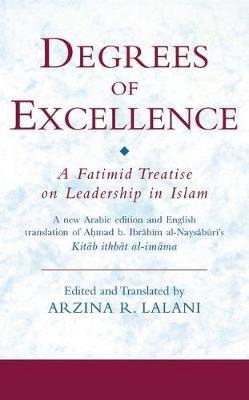One of the most distinguished scholars of his time, Aḥmad b. Ibrāhīm al-Naysābūrī lived during the height of Fatimid rule in Egypt. He came from Nishāpūr, the centre of the Ismaili daʿwaLit. ‘summons’, ‘mission’ or invitation to Islam. Amongst Shi’i Muslims, it was the invitation to adopt the cause of the Imamat. It also refers more specifically to the hierarchy of… in Khurāsān, a thriving centre of learning particularly noted for its use of rationalistic philosophy. Several important works are accredited to him, but it is the Kitāb ithbāt al-imāma which is of particular significance for the development of philosophy in medieval Islamic thought. In this work, presented here in a new edition and translation, al-Naysābūrī allows us to understand not only the significance of his own thought, but also the beliefs of his age. Rather than basing his assertions exclusively on the authority of the Qurʾan and ḥadīthLit. ‘report’ or ‘narrative,’ used for the traditions of the Prophet Muhammad and in Shi‘i Islam also for those of the Imams., he applies rational tools to explain his theology, providing a philosophical affirmation of the imamate by presenting a range of arguments, foremost amongst which is the theory of the ‘degrees of excellence’. Degrees of Excellence offers the first book-length study of this hitherto unknown scholar of the early 5th/11th century. This invaluable source of Fatimid historiography will prove essential reading for students of Islamic history, philosophy and theology. It will also serve as a useful reference for modern Shiʿi communities of all persuasions.
Preface and Acknowledgements
Introduction
The Author and his Works
The Contents of Kitāb ithbāt al-imāma
Themes in the Text
Degrees of Excellence
Description of the Arabic Manuscripts
Notes on the Translation
Translation of Kitāb ithbāt al-imāma: Book on Affirming the Imamate
Select Bibliography
English Index
Arabic Index
Arabic Text
Arzina R. Lalani received her doctorate from the Department of Arabic and Middle Eastern Studies, University of Edinburgh. She is currently a Research Associate at The Institute of Ismaili Studies, London. A specialist in medieval Arabic literature and Shi‘i thought, she is the author of Early Shī‘ī Thought: The Teachings of Imam Muḥammad al-Bāqir (2000) which won prestigious literary awards and has been translated into several languages.

